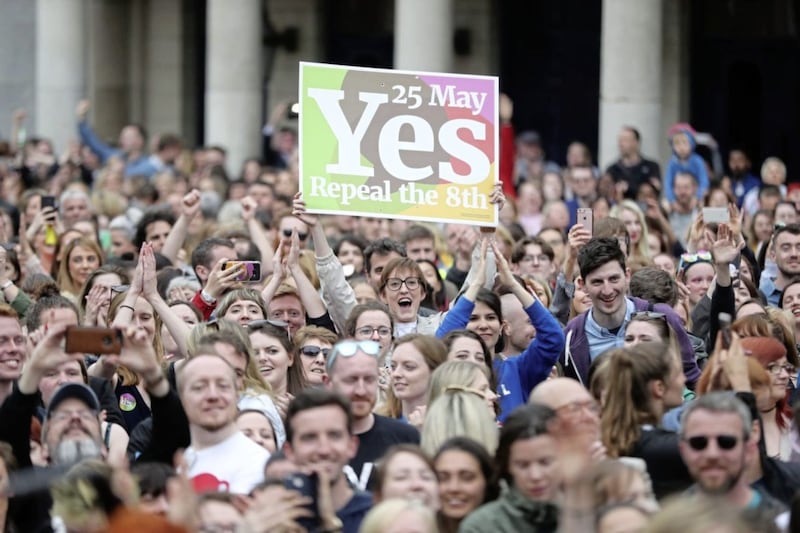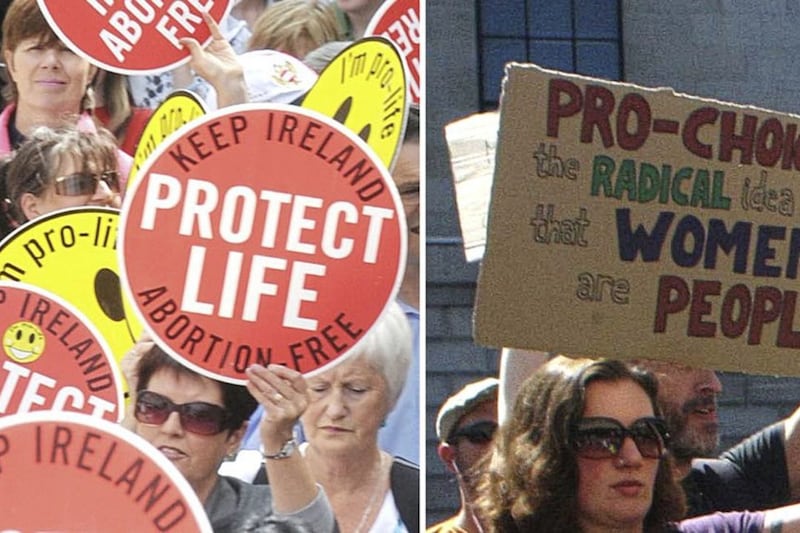The hierarchy of the Catholic Church have voiced their disappointment at the outcome of the Repeal of the Eighth Amendment.
Despite having 2,000 years of opposition to abortion the Church’s resistance to the repeal shone dimly to the point of non-existence. This while Catholic pro-choice politicians recanted their trust and insisted there is no incompatibility between campaigning for abortion and their Catholic faith.
The Church has to keep a low profile, it has too much baggage, cry those with no confidence for the combat. Does this mean that today’s priests who have devoted their lives to the Church must carry the sins of their profligate brothers to the third and fourth generation? The Church must arise from its self-imposed slough of despond and stop toadying to those who would wallow in its demise. If membership is lost as a result so be it. Whether we embrace them or not the words ‘where two or three are gathered in My name’ still resonate.
WILSON BURGESS
Derry City
Families need more than broken promises and stonewalling
In her forward to the Consultation Paper, British colonial secretary Karen Bradley wrote legacy mechanisms “must seek to meet the needs of victims” and “must be fully consistent with the rule of law”. She then saluted British crown forces, pledging to “reject any attempts to rewrite the history of the past” or “displace responsibility from the people who perpetrated acts of terrorism”. What happens when such lofty aspirations collide?
The Ballymurphy Massacre illustrates the point. These victims and survivors need truth. They believe British troopers ‘protected’ Ballymurphy by murdering 11 residents, including a Catholic priest and mother of eight. The British then “displaced responsibility”, blaming the victims. Requests for inquest funding met with hurtful dismissals. References to “innocent victims”, implied that Ballymurphy Massacre victims were not among the ‘innocent’.
These families fought a heartbreaking legal battle to get truth. They believe an inquest with eyewitness testimony under the rule of law can deliver it. What does Ms Bradley do if these victims are right?
She says her Tory regime will reject any attempt to rewrite history.
If the evidence proves that the 11 killings were murders, how can she reject rewriting history with truth? Does she simply ignore inconvenient facts, like Theresa May seemed to ignore Ivor Bell, Gerry McGeough and Seamus Kearney, asserting only British forces get investigated for the past? How would Ms Bradley escape shifting blame from exonerated ‘innocent victims’ back onto British troops for murder and smearing the dead?
What about collusion? The law holds those who pay for, direct, procure weapons, identify targets, cover-up, or otherwise conspire in murders, are jointly criminally responsible for these murders. What if new legacy mechanisms confirm that the Glenanne Gang and other murders claimed by loyalists should be counted jointly as British state collusion murders?
How does Ms Bradley ‘displace responsibility’ from British crown forces for their role in such acts of terrorism or reject recording the truth? Can Britain bury such crimes in a national security pit?
Ms Bradley also wants legacy proposals to “reflect a broad political consensus and be balanced, fair, equitable and crucially, proportionate”.
‘Political consensus’ has been the pretext for a DUP clamp on funding needed to give nationalists their chance for justice.
Because crown forces only admit to 10 per cent of Troubles killings, “balanced and proportionate” have become code words for a quota on investigations of British crown killings which ignores collusion and state cover-ups.
Too many promises of legacy justice have been broken. Victims must get more than broken promises and stonewalling. It may be their last chance.
MARTIN GALVIN
New York
Advice at hand on how to manage exam stress
Exams are an inevitable part of life for schoolchildren and this year will be no different as many teenagers across Northern Ireland are now in the midst of GCSE and A-Level exams.
It is an important time for young people who are looking to do well so they can take the next step in their chosen education or career path. But for many it is a time of immense stress, with some feeling that the pressure is becoming too much for them to take on alone.
Our Childline service is here to help with those concerns. New figures from the NSPCC service reveal it delivered 92 counselling sessions last year (2017/18) to children from Northern Ireland who were struggling to cope with the pressures that the exams were putting on them.
It is important that young people know that they are not alone and that Childline will listen to them. We understand that getting good results is important but we want to calm and reassure them that they always have options.
There are lots of tips and advice for young people and their families on the Childline website on how to manage exam stress. These include: Taking regular breaks from revising and getting a good night’s sleep; going for a walk or doing some exercise; listening to calming music; playing a game or taking some time out to take your mind off your worries and stress for a bit; trying to think positively.
We would also encourage young people to talk to a family member or teacher if things are getting on top of them. Please remember that Childline is always available to chat online or on the phone 0800 1111 or at childline.org.uk
MAIREAD MONDS
Childline Manager for Northern Ireland
A world of ambiguities
Women have been the subject of a relentless and I would say intolerable campaign by groups purporting to be working for their betterment by providing choice and control over their bodies with the same language of emancipation and tactics seen in the 1950s and 1960s with regards to contraception and sexual liberty. We must find paths to making informed decisions before we arrive at the stark choice many find themselves faced with. This should be through the provision of sexual and mental health education so that we can prevent outcomes that may damage and destroy all involved. Never before has humankind been faced with such pace of change and the human condition has been unable to catch up. We are left confounded in a world of ambiguities – a world with all the rights and no wrongs.
The inequalities of the past are being eradicated, but we must not lose sight of the values that civilisations were built upon. And if ours is to survive and prosper it will be dependent on how well we treat our most vulnerable – from the old to the very young.
LAURENCE TODD
Belfast BT15
Making a difference
My dad, Sam, was diagnosed with Parkinson’s in 2010 and over the last eight years both he, my mum and our family have had to learn to adjust to the many challenges this debilitating illness has brought.
This cruel neurological condition can take so much from those living with it – and those who love them. But getting the right support can make such a difference.
That’s why I urge readers to support the charity Parkinson’s UK by signing up to take part in its Causeway Coast Challenge fundraiser, details of which can be found at www.parkinsons.org.uk/causewaycoastultra.
It needs to recruit 300 people to walk or run along the stunning cliff tops, beaches and footpaths of the North Atlantic Coast this September and help raise £100,000.
CLAIRE McCOLLUM
Newtownabbey, Co Antrim







